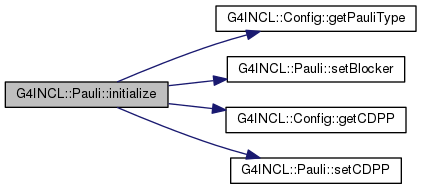|
Geant4
10.03.p01
|
|
Geant4
10.03.p01
|
Functions | |
| G4bool | isBlocked (ParticleList const &p, Nucleus const *const n) |
| Check Pauli blocking. More... | |
| G4bool | isCDPPBlocked (ParticleList const &p, Nucleus const *const n) |
| Check CDPP blocking. More... | |
| IPauli * | getBlocker () |
| Get the Pauli blocker algorithm. More... | |
| IPauli * | getCDPP () |
| Get the CDPP blocker algorithm. More... | |
| void | setBlocker (IPauli *const) |
| Set the Pauli blocker algorithm. More... | |
| void | setCDPP (IPauli *const) |
| Set the CDPP blocker algorithm. More... | |
| void | deleteBlockers () |
| Delete blockers. More... | |
| void | initialize (Config const *const aConfig) |
| Initialise blockers according to a Config object. More... | |
Pauli blocking.
| void G4INCL::Pauli::deleteBlockers | ( | ) |
Delete blockers.
Definition at line 87 of file G4INCLPauliBlocking.cc.

| IPauli * G4INCL::Pauli::getBlocker | ( | ) |
Get the Pauli blocker algorithm.
Definition at line 57 of file G4INCLPauliBlocking.cc.
| IPauli * G4INCL::Pauli::getCDPP | ( | ) |
Get the CDPP blocker algorithm.
Definition at line 59 of file G4INCLPauliBlocking.cc.
| void G4INCL::Pauli::initialize | ( | Config const *const | aConfig | ) |
Initialise blockers according to a Config object.
Definition at line 94 of file G4INCLPauliBlocking.cc.


| G4bool G4INCL::Pauli::isBlocked | ( | ParticleList const & | p, |
| Nucleus const *const | n | ||
| ) |
Check Pauli blocking.
Note: This is a "pure" function: it doesn't retain or modify any state at all and thus only depends on its arguments.
| p | list of modified and created particles |
| n | the nucleus |
Definition at line 69 of file G4INCLPauliBlocking.cc.

| G4bool G4INCL::Pauli::isCDPPBlocked | ( | ParticleList const & | p, |
| Nucleus const *const | n | ||
| ) |
Check CDPP blocking.
Note: This is a "pure" function: it doesn't retain or modify any state at all and thus only depends on its arguments.
| p | list of created particles |
| n | the nucleus |
Definition at line 78 of file G4INCLPauliBlocking.cc.

| void G4INCL::Pauli::setBlocker | ( | IPauli * const | pauliBlocker | ) |
Set the Pauli blocker algorithm.
Definition at line 61 of file G4INCLPauliBlocking.cc.

| void G4INCL::Pauli::setCDPP | ( | IPauli * const | cdpp | ) |
Set the CDPP blocker algorithm.
Definition at line 65 of file G4INCLPauliBlocking.cc.
